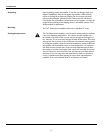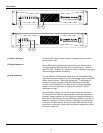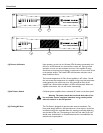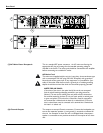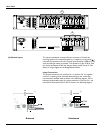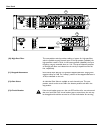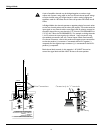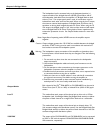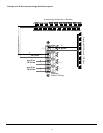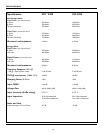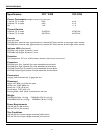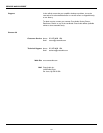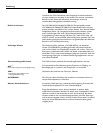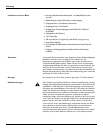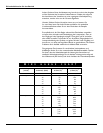
1
Each channel of the CM
2204-AB/DV or CM 2208-AB/DV can be used in
Direct Drive (Low-Z, 70V or 140V) or Isolated Drive (100V of 50V) appli-
cations.
This mode allows each output of the channel pair to drive a 4 or 8 Ohm
loudspeaker load. Use Bridged Mode (See Bridged Mode section) to deliver
the power of both channels to a single 8 Ohm load such as a subwoofer.
This mode allows each output of the channel pair to directly drive a 70
Volt constant-voltage audio distribution system. Use the Bridged Mode (See
Bridged Mode section) to deliver the power of both channels to a 140 Volt
constant-voltage audio distribution system.
The output of the CM 2204-AB/DV and CM 2208-AB/DV can be converted
to 100V or 50V with the optional CMX4-50/CMX4-100/CMX8-50/CMX8-
100 accessories, respectively.
The loudspeaker load is connected only to the designated positive (+)
output terminals of the bridged channels. NEVER ground either side of
the loudspeaker load cable when the amplifier is in Bridged Mode as both
sides are “hot.” If an output patch panel is used‚ all connections must be
isolated from each other and from the panel. When using the low-Z output‚
the minimum nominal load impedance in Bridged Mode is 8 Ohms; this is
equivalent to driving both bridged channels at 4 Ohms. When using the 70
Volt output‚ the bridged output is 140 Volts and the minimum load imped-
ance in Bridged Mode is 50 Ohms. Driving loads of lesser impedance may
activate the protection circuits. See Output Modes section for more infor-
mation.
Regardless of operating mode‚ NEVER connect the amplifier outputs
together.
Output voltages greater than 120 V RMS are available between the bridged
terminals. CLASS 3 wiring must be used in accordance with national and
local codes to connect the loudspeaker system.
The loudspeaker output connections of this amplifier are hazardous when
live and present a shock hazard when they are energized. Take the following
precautions:
1. Do not touch any bare wires that are connected to the loudspeaker
output connectors.
2. Use insulated loudspeaker cables and touch-proof connectors on the
loudspeakers.
3. Do not attempt to make connections to the output connectors or the
loudspeaker connectors when the amplifier is turned ON.
4. Double-check all connections and make sure there are no exposed wires
or connectors before turning the on amplifier.
5. Make sure there are no frayed cables or wires and that all connections
are tight and secure every time before turning the amplifier on.
6. External wiring connected to these terminals requires installation by a
trained person or the use of ready-made leads or cords.
Note:
Caution:
Warning:



